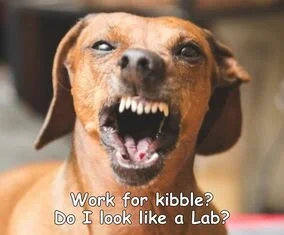Why We Use Food to Train Dogs
It's poetic to think that dogs want to please us, but the reality is that dogs really just want to please themselves. In fact, there are two primary factors that motivate a dog to do something: To earn a reward or to avoid a punishment. When training a dog we should be setting up our dogs for success so they earn a yummy piece of food rather than punishing them for getting it wrong. Wouldn't you like a pat on the back or a little bonus in your check instead of being chided by your boss?
Food is a very powerful motivator for training dogs, but not all food is created equal. The quality and amount of food can have a direct effect on behavior. Animals work harder for more tasty (and smelly) foods. Also, if given a choice, animals prefer several small bits of food to one large bit of food, even if they both add up to the same amount. This is because the act of engaging in eating is itself very reinforcing. For instance, your dog's kibble or dry biscuits may work in the house when there are little or no distractions. Those dry morsels might be equivalent to a $10 an hour job for us. But once we step outside we have to give our dogs a "raise". In the yard or driveway maybe $20 an hour (e.g. commercial training treats, string cheese) will work. On a walk in an uncrowded space we may have to pay $50 an hour (e.g. stinky cheeses, hot dogs, liver, peanut butter), but a crowded event or visitors to the house requires us to shell out the big bucks!: Chicken, beef, sausage, spray cheese = $100 an hour.
Follow these tips* to help make your training more valuable to your dog:
Use small, soft treats - about the size of a pea. These treats can be eaten quickly. They also allow you to be generous without over-feeding your dog. Remember, dogs don't care how big the treat is. They're more interested in how many they get.
Try different types of treats. It doesn't have to be labeled as such to work, so think outside the box. For a dog that was extremely distracted outside I had great success with whipped cream!
To reiterate the point above, what's exciting at home may not get your dog's attention somewhere else. Save your "special" treats for those occasions.
Get into the habit of petting your dog and saying "Good dog" (or boy, or girl) as you give the treat. By doing so you raise the value of your touch and your voice. Now you have other ways to "pay" your dog when food isn't available.
If your dog has dietary restrictions and you can only use kibble, ask your vet if you can put the kibble in a baggie with some hot dogs or other savory food so the kibble will take on that smell.
Don't over do it. Our goal is a trained dog, not a fat dog. If you are doing a lot of training that requires an abundance of food consider cutting back on your dog's regular diet in order to compensate for the additional calories.
The bottom line: Food is a motivator, just like your paycheck. You wouldn't do a difficult job for minimum wage. Why expect your dog to?
* Excerpted from the Association of Professional Dog Trainers

